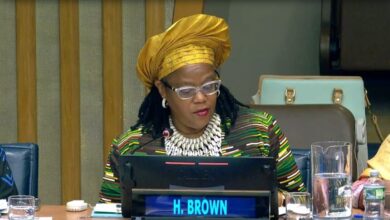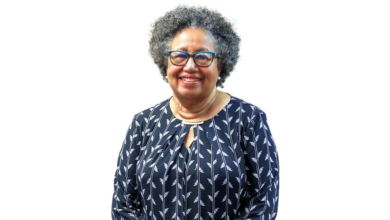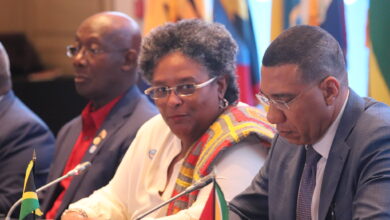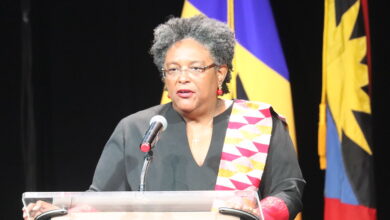Caribbean Movement for Reparatory Justice
We are not beggars! We are not subservient! We do not want Charity and handouts!
We want Justice! Reparatory Justice! Sir Hilary Beckles
Reparations for the slave era is an issue that has increasingly resonated in recent years and CARICOM, at its highest level of decision making, has placed this issue on the front burner of its agenda. A Ten Point Action Plan for Reparatory Justice[1] was endorsed by Heads of Government, in March 2014, and is being used as the basis for discussions on reparations. In 2013, CARICOM Heads of Government established the CARICOM Reparations Commission (CRC); its mandate to prepare the case for reparatory justice for the Region’s indigenous and African descendant communities who are victims of Crimes against Humanity (CAH) in the forms of genocide, slavery, slave trading and racial apartheid.
CARICOM Ten Point Plan for Reparatory Justice
The Plan outlines “the path to reconciliation and justice for victims of crimes against humanity and their descendants”. It calls for:
- A full formal apology, as opposed to “statements of regrets” that some nations have issued.
- Repatriation, pointing out the legal right of the descendants of more than 10 million Africans, who were stolen from their homes and forcefully transported to the Caribbean as the enslaved chattel and property, to return to their homeland.
- An Indigenous Peoples Development Programme to rehabilitate survivors.
- Cultural Institutions through which the stories of victims and their descendants can be told.
- Attention to be paid to the “Public Health Crisis” in the Caribbean. The Caribbean has the “highest incidence of chronic diseases which stems from the nutritional experience, emotional brutality and overall stress profiles associated with slavery, genocide and apartheid”.
- Eradicating illiteracy, as the Black and Indigenous communities were left in a state of illiteracy, particularly by the British.
- An African Knowledge Programme to teach people of African descent about their roots;
- Psychological Rehabilitation for healing and repair of African descendants’ populations.
- Technology Transfer for greater access to the world’s science and technology culture
- Debt Cancellation to address the “fiscal entrapment” that faces Caribbean governments that emerged from slavery and colonialism.
CARICOM Reparatory Justice Programme now a global model
CARICOM has been providing inspiration for reparatory justice at the global level. Among the outcomes of an International Summit on Reparations which was held in April 2015 in the US was the establishment of a Global Reparations Committee. This Committee will utilize the same model being used by the Caribbean Reparations Committee. For the first time, the United States has established a reparations committee, and so have many countries around the world.
Some Milestones of the Caribbean and Global Reparatory Movement
The following are some milestones, regional and global, as CARICOM continues its mandate to prepare and present the evidence that Great Britain and other European states were “the beneficiaries of enrichment from the enslavement of African peoples, the genocide of indigenous communities and the deceptive breach of contract and trust in respect of Indians, and other Asians brought to the plantations under indenture”.
9-12 April 2015: An International Reparations Summit held in New York and hosted by the Institute of the Black World 21 Century (IBW) ended with a call for Caribbean Governments to move ahead with the recommendation that the slave-owning and slave-trading European national be invited to attend an inter-governmental reparatory justice summit in 2015. The Conference also agreed that two global reparations summits be held, first in 2016 in the Caribbean, and the second in 2017 in Europe.
The Summit was attended by 205 reparations advocates from twenty-two countries, including eight of the thirteen Member States represented on the CARICOM Reparations Commission; seventeen States in the USA, representatives of the CARICOM Secretariat; Civil Society representatives of Martinique and Guadeloupe, United States Virgin Islands, Brazil, Canada, the European Reparations Commissions; academics from across the United States, activists and students
27 January 2015: In a historic decision, the Parliament of Jamaica supported a motion introduced in the House to pursue reparations from Great Britain.
10 December 2014:
The UN General Assembly launched the International Decade for People of
African Descent (2015-2024) which was adopted by the United Nations
General Assembly by Resolution 68/237 [3] dated 23 December 2013.
Professor Sir Hilary Beckles delivered an address at the launch.
1-4 October 2014: The Government of Antigua and Barbuda
hosted the Second Regional Conference on Reparations. The Conference
was convened under the theme Scientific Engagement and Community
Mobilisation ; its stated objective, to widen the dialogue and intensify
scientific and popular discourse on the CARICOM’s Reparations
Commissions Ten-point Action Plan for reparatory justice. This
conference brought together a number of expert economists, lawyers,
academics, historians, faith-based leaders, community activists,
scientists, journalists and artists to further map out national and
regional strategies to advance the case for reparations from Europe.
September 2014: Professor Sir Hilary Beckles and the Hon. Camillo Gonsalves, Minister of Foreign Affairs, St. Vincent and the Grenadines, addressed the Congressional Black Caucus Foundation’s annual Legislative Conference on the Caribbean’s initiative for reparatory justice.
16 July 2014: Professor Sir Hilary Beckles, Chairman of the CARICOM Reparations Commission (CRC) addressed the House of Commons, Parliament, Great Britain on the issue of Reparations.
1-4 July 2014: the Thirty-fifth Meeting of the Conference of Heads of Government discussed the issue of Reparations for Native Genocide and Slavery, including the budget and Draft Notice of Complaint Regarding Slavery and Indigenous Genocide, prepared by Leigh Day, Legal Consultants.
11 March 2014: A meeting of CARICOM Nations unanimously approved the ten-point plan proposed by the CRC.
23 December 2013: The Un General Assembly at its 72nd plenary meeting adopted the draft resolution (SeeA/68/PV.72). It also requested the Intergovernmental Working Group on the Effective Implementation of the Durban Declaration and Programme of Action to develop a draft programme for the implementation of the International Decade for People of African Descent to be finalized and adopted during the sixty-eighth session of the General Assembly and not later than 30 June 2014.
September 2013: The CARICOM Reparations Commissions is established with Professor Sir Hilary Beckles as its Chairman.
July 2013: The Thirty-Fourth Meeting of CARICOM Heads of Government agree to set up National Committees on Reparations to establish the moral, ethical and legal case for the payment of reparations by the former colonial European countries, to the nations and people of the Caribbean Community for native genocide, the transatlantic slave trade and a racialised system of chattel slavery. Heads also agreed to establish a CARICOM Reparations Commission comprising the Chairs of the National Committees and a representative of the University of the West Indies (UWI) which would report directly to a Prime Ministerial Sub-Committee on Reparations, chaired by the Prime Minister of Barbados, the Hon. Freundel Stuart.
References:
http://www.leighday.co.uk/News/2014/March-2014/CARICOM-nations-unanimously-approve-10-point-plan
http://libraryresources.unog.ch/content.php?pid=497581&sid=5357498
CARICOM PRESS RELEASES
Quotes
The 21st Century will be the century of global reparatory justice. Citizens are now, for the first time since they were driven into retreat by colonialism, able to stand up for reparatory justice without fear. Their claim, their just claim for reparations will not go away. Rather, like the waves upon our beautiful shores, they will keep coming until reparatory justice is attained.” Hilary Beckles
CARICOM Ten Point Plan for Reparatory Justice
Facts and Figures
In 2013, CARICOM Heads of Governments established the CARICOM Reparations Commission [CRC] with a mandate to prepare the case for reparatory justice for the region’s indigenous and African descendant communities who are the victims of Crimes against Humanity [CAH] in the forms of genocide, slavery, slave trading, and racial apartheid.
CARICOM member countries, “ancestral homes to the world’s first complete slave-based economies”, have established national and regional Commissions in order to engage the nations, the owners and operators of these slave economies, in a diplomatic dialogue designed to rebuild trust and respect within the framework of reparatory justice”
The main legal instrument through which the reparations claim is to be advanced is the International Convention on the Elimination of All Forms of Racial Discrimination (CEFR)
This document, prepared by the CRC, proposes the delivery of this
mandate within the formulation of the CARICOM Reparations Justice
Program [CRJP]. The CRC asserts that victims and descendants of these
CAH have a legal right to reparatory justice, and that those who
committed these crimes, and who have been enriched by the proceeds of
these crimes, have a reparatory case to answer.
The CRJP recognizes the special role and status of European governments
in this regard, being the legal bodies that instituted the framework for
developing and sustaining these crimes. These governments, furthermore,
served as the primary agencies through which slave based enrichment
took place, and as national custodians of criminally accumulated wealth.
100 years of colonial oppression followed 250 years of slave trading and chattel slavery. Slavery which ended in 1838 was replaced by a century of racial apartheid, including the denigration of Asian people. The regime of enslavement was crafted by policies and attitudes that were clearly genocidal. Indigenous genocide, African chattel slavery and genocide, and Asian contract slavery, were three acts of a single play – a single process by which the British state forcefully extracted wealth from the Caribbean resulting in its persistent, endemic poverty.
British slave ships bought 5.5 million enslaved Africans into their Caribbean colonies over 180 years. When slavery was abolished in 1838, they were just 800,000 persons remaining, representing a retention /survival rate of 15 %.
Jamaica received 1.5 million Africans. Only 300,000 (20%) remained at Emancipation.
Barbados received 600,000 Africans. Only 83,000 (14%) remained at Emancipation.
Jamaica, Britain’s largest slave colony, was left with 80% black functional illiteracy at Independence in 1962.
Barbados, Britain’s first slave society, is now called the amputation capital of the world. It is here that the stress profile of slavery and racial apartheid; dietary disaster and psychological trauma; and the addiction to the consumption of sugar and salt, have reached the highest peak.
The 1833 Act of Emancipation forced the people of the Caribbean to pay more than 50% of the cost of their own emancipation.
The Parliament of Great Britain in 1833 determined that the 800,000 enslaved people in the Caribbean were worth, as chattel property, £47 million. This was their assessed market value.
The Parliament of Great Britain determined that all slave owners should receive just and fair compensation for the official taking away of their property.
The Parliament of Great Britain provided the sum of £20 million in grants to the slave owners as fair compensation for the loss of the human capital and determined that the remaining £27 million would be paid by the enslaved peopled to their enslavers by means of a four-year period of free labour, called Apprenticeship.
The £20 million paid the enslavers by the Parliament of Great Britain was less than the £27 million paid by the enslaved to the enslavers as dictated by this House.
The Parliament of Great Britain determined that the enslaved people would receive none of this compensation. The argument made was that “property” cannot receive property compensation. The Parliament of Great Britain in its emancipation Act, upheld the law that black people were not human, but property.
It took all of the 19th century to uproot slavery from the Caribbean; from Haiti in 1804 to the Spanish sub-region in the 1880s. It took another 100 years to create citizenship, nationhood, and democracy across the Caribbean as a development framework.
Source: Extracted from address delivered by Professor Sir Hilary Beckles, Chairman of the CARICOM Reparations Commission to the House of Commons. Parliament of Great Britain, 16 July 2014






